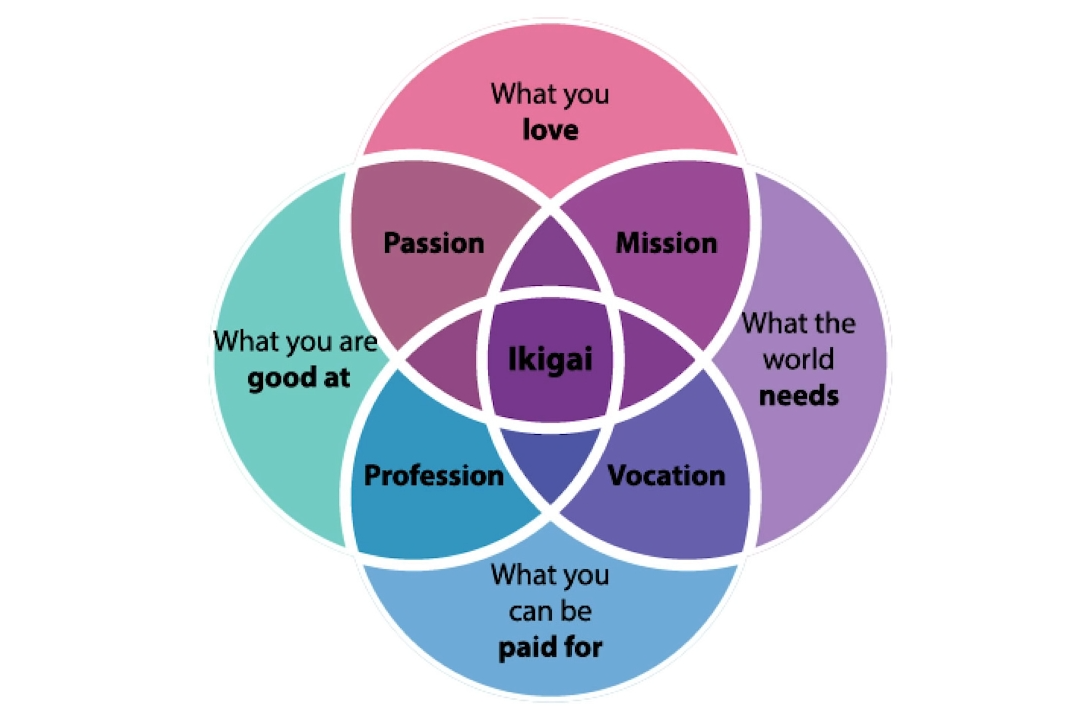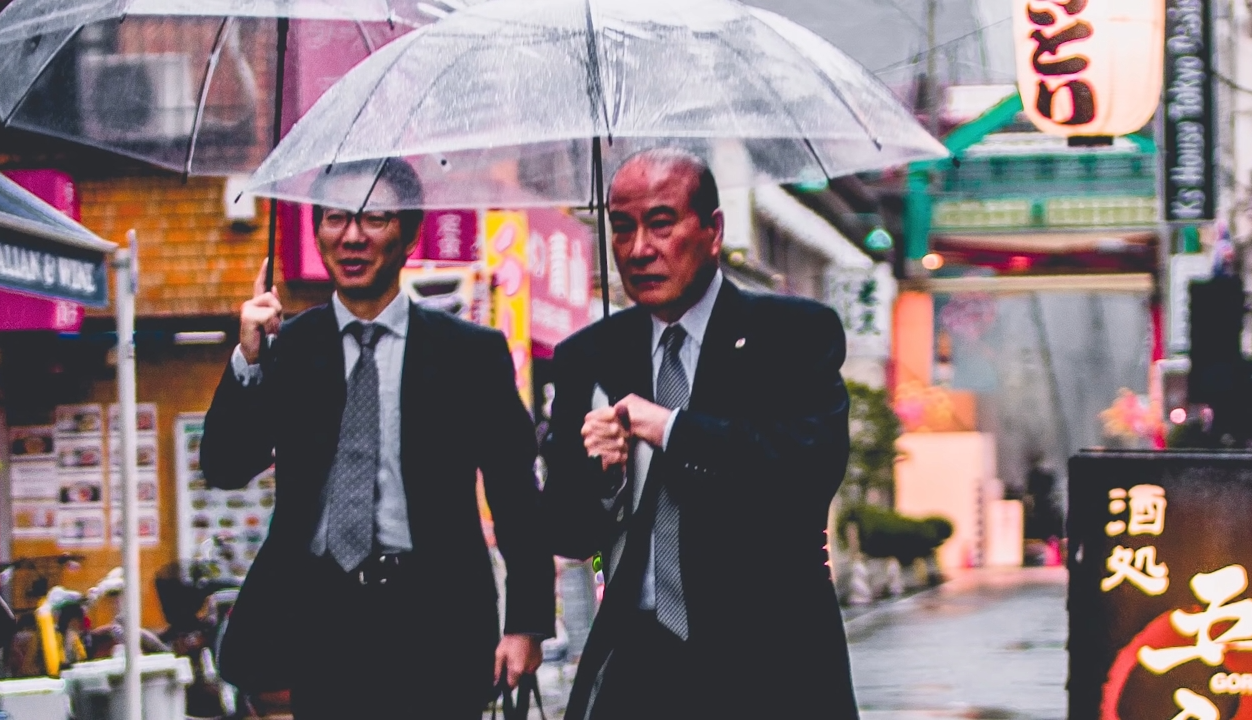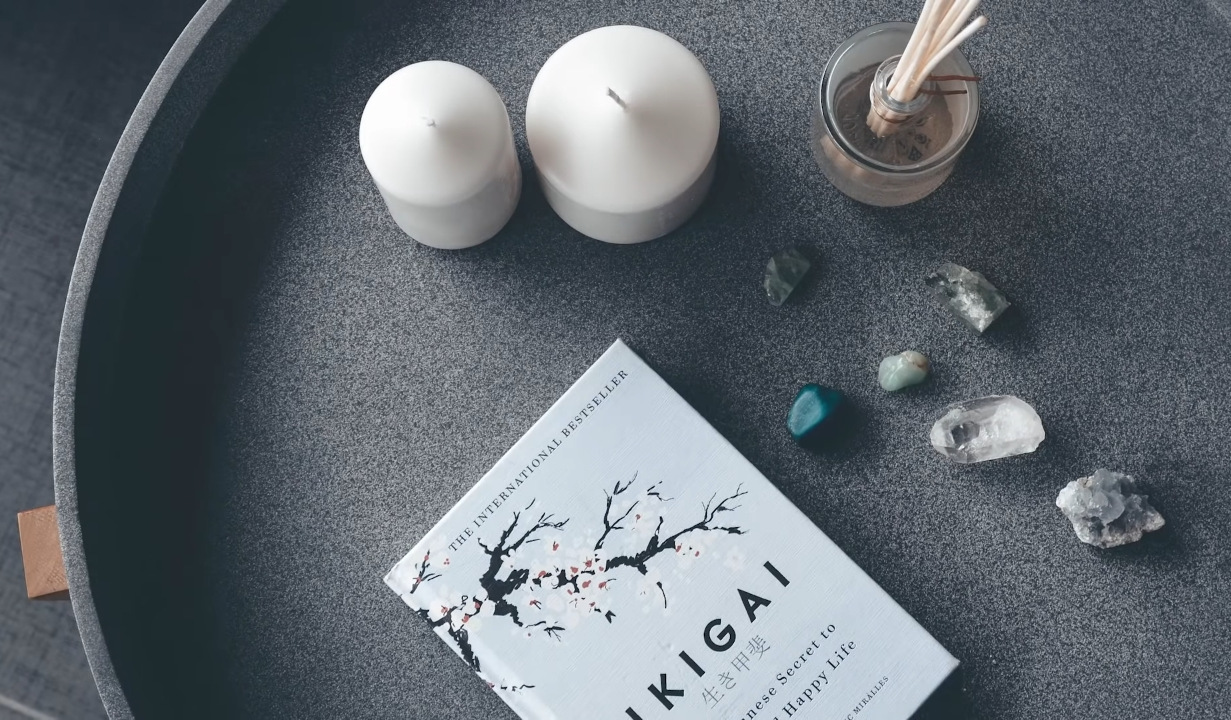1. Concept:

For example, the concept of "ikigai". If translated as "life purpose", it seems a bit superficial. In Europe, it is often referred to as "mission" and "dedication", but at the very least, it should be understood as the feeling of having a meaningful reason to live, so that every morning one can easily rise with the joyful emotion to live a truly effective, meaningful, and happy day. To simply understand "ikigai", let’s take any individual. There will be four areas: what this person loves to do the most, what this person is best at, what society needs most from this person, and what this person can earn money from. When looking at the diagram of four overlapping circles, we will clearly see the concept of "ikigai".
It must be said that the history of this concept is very old, at least since the 14th century. Miyamoto Musashi, in his book "The Book of Five Rings", mentioned "ikigai". This book is now also studied by Westerners to apply in business, just like the books of Confucius and Laozi. This concept is quite important for those who want to self-develop, but it changes over time and also varies from individual to individual. For example, from the early 20th century until the end of World War II, this term included nationalism and loyalty, so "ikigai" was quite synonymous with "shinnokai" - what is worth sacrificing for. Therefore, we can somewhat understand the reason why the Japanese kamikaze were willing to crash planes into the American fleet and bases at Pearl Harbor. It was not until the mid-1960s, along with the boom of the Japanese economy, that "ikigai" took on a meaning similar to what it means today.
Today, for the Japanese, it is truly happy if each person can find and pursue their own "ikigai". At that time, they will often feel joyful and satisfied with life. Many Westerners also find their "ikigai", but unlike Japanese society, this is often a personal effort of some intellectuals or successful businessmen. In Japan, from a young age, each individual is guided to find their "ikigai", and most of them will find it.
Take an example from the life of an ordinary Japanese person. From a young age, Western children are educated as independent individuals, the more different the better. But in Japan, children are familiarized with discipline from a young age, feeling themselves as members of a group, with similar thoughts and behaviors. Teachers require this, even though they are often criticized by Western educators, but the Japanese do not care at all about what the rest of humanity thinks of them.
2. Working:

When growing up and going to work, you might think that the Japanese work for money. That is true, but not entirely accurate. They work primarily to contribute to the company, the boss, the family, and society. They wake up early, travel by train for hours to arrive on time for work, with no concept of being late. They are willing to wear black suits like millions of others or uniforms like thousands in the same corporation. When they meet, they bow and always smile at customers, superiors, and colleagues. If you think they are insincere, that is just a subjective thought. They are willing to work overtime to complete tasks and usually strictly adhere to discipline and instructions from superiors. For example, to become a chef, employees in Japanese restaurants often have to wash dishes for three years before being taught other things, and may not be taught if the master feels they are not ready.
The Japanese are passionately dedicated to serving their company and rarely change jobs; they feel very ashamed if they are fired. This is also understandable because Japanese leaders only fire employees in special cases, unlike in the West or Vietnam, where firing can happen more easily. Of course, not every Japanese person is completely satisfied with their job or sees it as the best way to contribute to society. This is precisely the difficulty in finding one's "ikigai".
The good point of Japanese society is that each individual strives to find "ikigai" and many others help them in this endeavor. For example, in many Japanese companies, retirees are willing to work without pay, not to make the young brew tea or read newspapers, but to help them find joy and the best way to contribute to their work. I know tens of thousands of retired Japanese who still live comfortably but are still willing to help in this way.
However, they are willing to come to Vietnam to work for free training for Vietnamese businesses, but it seems that none of us have taken advantage of this valuable opportunity. The Japanese are willing to be part of a collective, but each person strives to find their own "ikigai". Their self-esteem is beyond question. To have "ikigai", interests and joy are indispensable; otherwise, one merely exists and cannot be said to live.
3. Hobbies:

In Japan, with the heavy conditions of living, working, and contributing, their hobbies will also be different and more complex. The Japanese, if given even the smallest opportunity, will strive to learn classical music, ballet, Formula 1 racing, or flying planes. It is no wonder that in various classical orchestras across Europe, there are quite a few Japanese artists, and ballet troupes also have Japanese dancers. They learn music and dance to satisfy their joy rather than to earn money, as these jobs require significant investment and decades of study.
Even in entertainment, the Japanese are very different from the rest of the world. Just look at how they watch football and clean up at the World Cup to know. Their "thorough" technology is also more sophisticated than that of Westerners and more complex than ours. This is also how they relieve stress after hours of hard work.
A study by Toshimichi Sone and colleagues at the Tohoku Medical Center in Sendai, Japan, in 1994 began a 7-year psychological study involving 40,391 elderly individuals aged 40 to 79, including the concept of "ikigai". The question "Do you believe this is the life you desire?" was posed with three response options: true, false, and uncertain. During the investigation, 3,048 people passed away. About 60% of those surveyed said they had "ikigai", and the overall study showed that their health was better compared to the group without "ikigai". Those who answered "no" tended to die earlier than those who answered "yes", but the number of cancer deaths showed no difference. The final results were published in 2008.
The rates were not too different. After 7 years of research, 95% of those who answered yes were still alive, while 83% of those who answered no were no longer living. This result leans towards "ikigai" and is confirmed by many other studies, not to mention that the quality of life of those with "ikigai" is also higher. While the Japanese seek "ikigai", we live here without any restrictions, but perhaps a few of you truly want to find your own "ikigai". For the Japanese, any time is suitable to start searching for "ikigai". I humbly advise that this is a long process, requiring a lot of effort, time, and cost. You need to answer questions about yourself. Each person is different; some may sit at night writing in a Facebook group, while others may be programmers engrossed in their work.
If you do not know who you are, stop to avoid wasting effort. This needs to be done correctly and truly honestly with oneself. Think about the future; who do you truly dream of being in this life? If you want to become a pediatrician, do not go study law. Do not think about future salaries, regardless of what others say. If you just want to be a driver for a travel company to go everywhere, define it that way, even if you are the only child of a prestigious family. Be honest with yourself. What topics do you enjoy discussing the most and are willing to discuss all night? What do you often watch on your phone? If you truly enjoy a subject, you will know what profession you should choose.
4. Discussion:

Nguyen Quang Thach loves to create children's book collections in rural areas, so of course, he had to give up his job as a paper scraper. Reflect on your own achievements. How many points did you get in the English exam? Are you excellent at karaoke? Have you ever sold items in a virtual game for real money? Write down those little prides on paper or on your computer. Successful people often overlook these things.
Keeping a record of daily life experiences, you may have a high-paying job or be praised by your boss, but if you cannot find joy at work, it means you need to seek another "ikigai". Formula 1 champion Lewis Hamilton once said that a job you love is a hobby that pays well. You can answer questions and use illustrative diagrams. Then, make a list of things you do not like to do and cross-check so that your "ikigai" is not related to that list. Only then can you clearly envision your "ikigai".
Many geniuses seek "ikigai" and advise the younger generation to find it, as Steve Jobs said: "Your work is a large part of your life, and the only way to be satisfied with it is to do what you consider great. And the only way to do great work is to love what you do."
Japanese society debated "ikigai" the most in the late 80s and early 90s when Japan faced overproduction and some Japanese adjusted their lives. Currently, as Japan overcomes the aftermath of the tsunami and economic crisis, "ikigai" is being discussed again. This article only provides the most basic information about "ikigai". There are many in-depth analyses of "ikigai" and how to find and pursue it in Vietnamese society. This is not common at all and does not guarantee you a dream life. Therefore, most of us can change ourselves, change our attitudes towards life to make it more meaningful. You can always become a better and happier person if you find and pursue your "ikigai". You can receive invaluable value from nature in Okinawa, where every Japanese knows their "ikigai", with a superior longevity rate.
